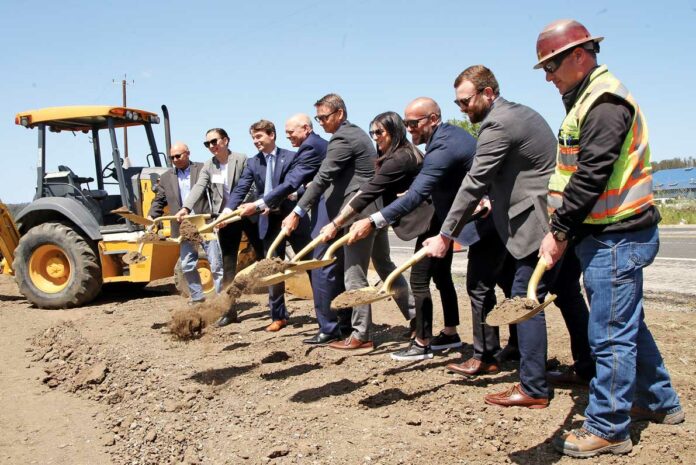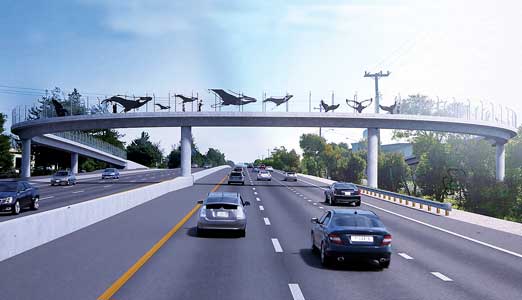
LIVE OAK—A group of local officials and community members gathered under a small mid-county parking lot located near Highway 1 Wednesday afternoon to celebrate the groundbreaking for a massive construction project expected to transform the corridor and revolutionize travel countywide.
Construction on phase 1 of the Watsonville–Santa Cruz Multimodal Corridor Program is set to begin this week. It includes widening Highway 1 and laying the groundwork for the bus-on-shoulder lanes from 41st Avenue to Soquel Drive.
The project also includes a bicycle and pedestrian bridge at Chanticleer Avenue.
Phase 1 is the start of a $100 million program that will make similar upgrades along the busy highway, which moves some 100,000 people per day.
Phase 2 will stretch from the Bay/Porter exit to State Park Drive, while Phase 3 will run from State Park Drive to Freedom Boulevard.
The long-awaited project is expected to ease traffic on Highway 1, encourage ridership of the county’s public transportation system and reduce greenhouse gas output.
“This has been a long time coming,” said Santa Cruz County Regional Transportation Commission Executive Director Guy Preston. “It’s a monumental effort, and we have so many more projects coming after it.”

All three phases include bicycle and pedestrian bridges. They also include a bus-on-shoulder lane along Highway 1, which keeps buses separate from personal vehicles, allowing traffic to move more quickly.
METRO CEO Michael Tree said that the agency aims to increase ridership to 7 million per year and to purchase a fleet of zero-emission buses.
In addition, Soquel Drive will also see improvements such as traffic signal upgrades and buffered bike lanes.
Santa Cruz County Supervisor Board Chair Manu Koenig said he has heard many constituents ask when the county will fix the highway.
“Well, here we are, finally doing just that,” he said.
Koenig, who has been an advocate for green transportation options such as converting the county’s 32-mile rail corridor into a bike and pedestrian path, said the project will help people choose alternative modes of travel.
“This is truly a fantastic transportation project and it’s thinking about our transportation facilities in a new way,” he said. “This truly is a linchpin for transportation in our community. If you’re driving north, you get stuck here. If you’re driving south, you get stuck here. So this project will improve flow through the heart of our community, the middle of our county. It’s going to help people going in both directions.”
Capitola Vice-Mayor Kristen Brown, who also serves as vice-chair for both Santa Cruz METRO and the Regional Transportation Commission, said her positions give her a unique perspective on the benefits the highway improvements will have for the community.
“These projects will bring about substantial improvements in traffic and safety operations, reduce cut-through traffic on our local streets and neighborhoods—which is something that has been happening in Capitola for quite some time—and enhance bicycle and pedestrian safety for active transportation users,” she said.
•••
Funding for Phase 1
$3.3 million from Measure D
$35.3 million from various sources: the State Transportation Improvement Program, Senate Bill 1 and the Caltrans Highway Infrastructure Program.












It’s not clear to me what about this Highway 1 widening project will “revolutionize” travel countywide, though I agree that the freeway corridor will certainly be “transformed”. There will be at least two more lanes of un-climate friendly pavement (with room for four between State Park and Freedom Blvd.) so automobile drivers can try to go faster between interchanges on new “auxiliary lanes” (note: these will NOT be through lanes). Highway 1 drivers will endure years of maddening construction delays with NO TRAFFIC RELIEF unless we plan ditch our cars and take the bus (where we can at least play on our phones while still stuck in traffic). The projects’ “Bus-on-Shoulder” concept seems like a nice idea, but buses need to go where people want to get on and off, which is not under a bridge on the shoulder of the freeway. Widening Highway 1 all the way to Freedom Blvd. will cost nearly half a billion dollars. Ask more questions.
@Linda – valid points., But we have been at a point where we sit in standstill traffic during the week for an hour to travel 15 miles (those of us not lucky or well off enough to live in santa cruz, capitola or aptos) because of an oversight of just how many of the workforce powering the economic hub would be travelling those measly two lanes for work every day. I agree its not perfect or the most climate friendly, but if that radical enough of a change were to happen, it would have started 20+ years ago when this problem started. Its not going to change anytime soon and we need relief.. be it with more people carpooling, more hybrid/electrics, work from home and yes, more physical pavement for the cars to drive on.